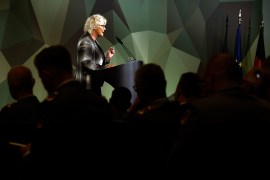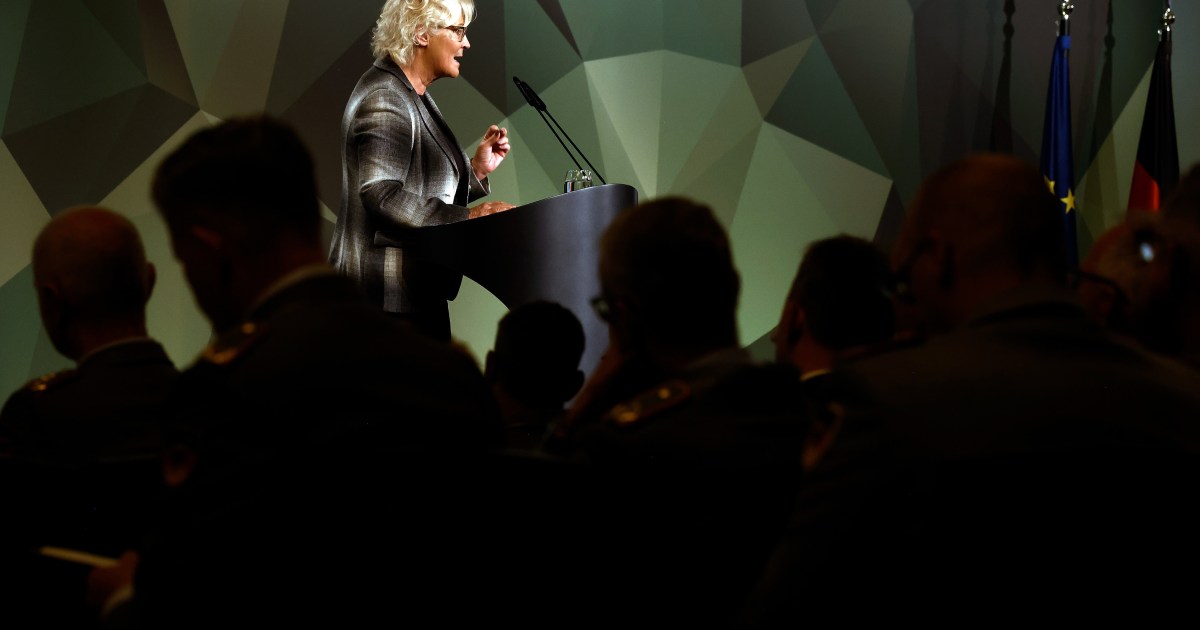
Life: it’s unfair. German Defense Minister Christine Lambrecht gave a long-prepared speech in Berlin on Monday, in which she laid out her thinking on strategy. She asserted confidently that Germany was destined by “our size, our geographical location, our economic power, in short our heft” to be a “leading power in Europe, whether we like it or not.”
The strategic adversaries uppermost in Lambrecht’s mind are, however, at home. She is striving to assert her authority at a time when the Foreign Ministry is writing Germany’s first ever national security strategy. It does not help that leaders of her Social Democratic Party (SPD)’s parliamentary group are vocal skeptics of what some pointedly refer to as “chic bellicism,” or a fashionable taste for war.
Lambrecht’s task is to remind them forcefully that the Zeitenwende, or turning point, promised by SPD Chancellor Olaf Scholz in a landmark speech after Russia’s attack on Ukraine needs to be sustained and funded. Especially for the armed forces.
Unfortunately, her audience — including Germany’s allies — was interested in a different question: how Berlin’s destiny to lead relates to Ukraine’s urgent requests for more heavy weapons. Contrary to the fears of many — and the hopes of some — across the west, Kyiv’s armed forces have achieved an astonishing rout of the invaders, regaining more territory in a week than Russia captured in five months.
Caution remains warranted. But for the first time, a Russian defeat appears possible if Ukraine can press its advantage across the long frontline. As Ukrainian Foreign Minister Dmytro Kuleba told his German counterpart Annalena Baerbock, this is impossible without armored infantry carriers and battle tanks.
Lambrecht, echoing Scholz, parried that no other ally had delivered Western-built infantry fighting vehicles or main battle tanks; that this would deprive NATO allies of German protection; and that Germany would never “go it alone.” Also, such weapons deliveries would represent an “escalation” — meaning Russian President Vladimir Putin could then consider Germany a direct participant in the conflict. This is the brightest of red lines for Scholz’s three-party ruling coalition.
Cue yet another fierce Berlin brouhaha over heavy weapons deliveries. Ricarda Lang, co-chair of Scholz’s Greens coalition partner, tweeted that “the time for hesitancy is over.” Parliamentary defense committee chair Marie-Agnes Strack-Zimmermann of the Free Democrats, the third coalition partner and herself something of a lethal weapon, demanded immediate deliveries of German Marder infantry carriers and Leopard 2 tanks.
More unusually, the U.S. Embassy in Berlin waded in with a three-part tweet thread: the U.S. appreciates German contributions; allies should support Ukraine “as much as possible”; each country is free to decide on the manner of its support (this last part blew up a smokescreen deployed for months by the German government).
Translated from diplo-speak: love you, Berlin, but please, please grow a pair and stop pretending we’re telling you what to do.
In truth, the government’s position is untenable. Other allies have sent armored infantry fighting vehicles to Ukraine. Some have sent tanks, mostly modernized Soviet-era versions. The 24 Gepard armorred air defense systems and 10 Panzerhaubitze 2,000 howitzers Berlin has sent to Ukraine, plus much other kit, have, by Kyiv’s admission, made a real difference in its counteroffensive. NATO Secretary-General Jens Stoltenberg is asking allies to prioritize deliveries to Ukraine. As for red lines, the Russian ambassador opines they were crossed a while ago.
The only serious concern about Leopard 2 tanks is that they are sophisticated machines which would require three or four months of training. But the Ukrainians are fast learners and Russia still occupies a fifth of their territory. Deciding to send the tanks now would send a powerful signal to the Kremlin that Germany won’t be intimidated.
During the Cold War, leaders of a partly sovereign West Germany intoned a trinity of compelling reasons (Zwang) why they absolutely could not do something: rules, allies, and facts (Normzwang, Bündniszwang, and Sachzwang). Usually, it meant they absolutely didn’t want to.
More than 30 years later, after the fall of the Berlin Wall and the regaining of full sovereignty, it’s a disingenuous habit Germany needs to shake off. It’s certainly unworthy of a country that aspires to leadership in Europe.


